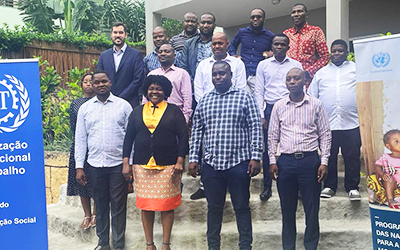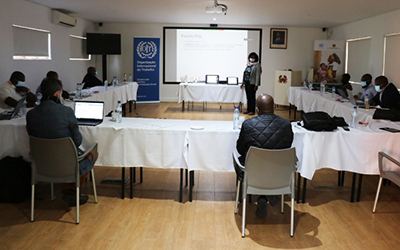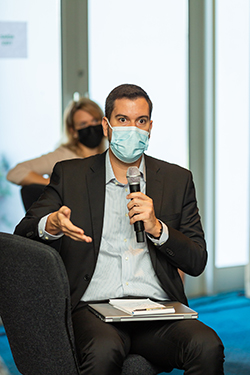Blog
Teamwork and capacity strengthening to promote development
The case of Mozambique
Designing and implementing public policies requires caution to guarantee the best use of scarce resources, especially in middle- and lower-income countries. One of the ways to achieve this goal is to simulate the potential tax and benefit impacts of different policies that are under consideration. In our SOUTHMOD training events, participants get to analyze the policies they find most important to their country.
Since 2015, UNU-WIDER has been developing and maintaining a tax-benefit microsimulation model for Mozambique (MOZMOD), in collaboration with the Ministry of Economy and Finance (MEF) of Mozambique, the Southern African Social Policy Research Insights (SASPRI) and the International Labor Organization (ILO).
The goal of the MOZMOD work is to enable and encourage the use of the model in the day-to-day work at government institutions in Mozambique. To facilitate this, training events for civil servants have been organized since 2016.

In 2021 and 2022 the trainings were held as five-day retreat events. The main goal of the retreat was to empower participants to use MOZMOD to answer policy questions they had, to get acquainted with the possibilities and limitations of MOZMOD and provide a forum for MOZMOD users to learn from each other. The extended retreats included more independent group work hours to facilitate the application of the model and its use after the course.
How did this happen, and what has been achieved?
Teamwork to deliver the course and define priorities
An essential element of the retreat has been the MOZMOD National Team, composed of our partners Vanda Castelo, Finorio Castigo, and Jose Cardoso from the Ministry of Economy and Finance. In collaboration with the specialists from SASPRI and UNU-WIDER, they delivered the in-person classes.

In 2021, focus was given to simulating the impact of key social protection programmes in Mozambique: the Basic Social Subsidy Programme (BSSP), the old-age pension scheme and the universal child benefit grant. In the 2022 retreat, the participants decided to simulate the impact of three major issues in the country:
1. the increase in prices due to the war in Ukraine
2. the value added tax (VAT) reform, which involves dropping both exemptions and zero-rating for many products
3. an expansion of the BSSP to more disadvantaged families
With all the pieces in place, participants were equipped to produce policy briefs presented to stakeholders at the Social Protection Weeks of 2021 and 2022 in Maputo. Here, we highlight the key messages from the policy briefs produced in 2021.
The importance of investing in children
In September 2018, UNICEF Mozambique and the National Institute of Social Action (INAS) started a Universal Child Benefit pilot programme. The overall objective of the programme is to reduce the mortality rates, hospitalizations, stunting, and undernutrition among children under two years of age. Thanks to the success of the pilot programme, the government decided recently to extend the policy to include more beneficiaries. The MOZMOD retreat participants contributed to the debate on this important programme by simulating the impact of extending the programme to all eligible children in the country.
The results point to a significant reduction in poverty and inequality, which is fundamental in a country where almost half of the population, about 16 million people, live below the poverty line (15,111 meticais). The introduction of the programme at the national level would reduce overall poverty by 2.9% and inequality by 1.9%. Despite the advantages, the programme would lead to a considerable increase in government spending, underlining the need for international partners to support the delivery of the programme.
Updating the Basic Social Subsidy Programme
The Basic Social Subsidy Programme (BSSP) is an unconditional cash transfer programme that delivers a fixed amount of money per month to eligible families. Despite the importance of the programme, due to fiscal constraints, the government has not updated the cash transfer amounts of the programme since 2018, and the programme covers only one third of the eligible population.
The four simulated scenarios for the BSSP highlight the importance of the programme for reducing poverty and inequality in the country. The fact that the programme is well-targeted implies that increasing the benefit amounts or expanding the programme leads to positive impacts for poorer families. Updating the amount of the cash transfer, from the current amount equivalent to 2/3 of the poverty line to 100% of the poverty line can reduce poverty by 0.5% and inequality by 1.2%. One of the scenarios explored expanding the current programme to all eligible households: this produced higher impacts but costs twice as much as updating the benefit for current recipients to 100% of the poverty line.
- See the Policy Brief (in Portuguese)
Closing the gap of protection for the elderly
Although Mozambique has legal instruments to protect and reduce the vulnerability of the elderly, 51% of the population aged 60 and over do not receive any kind of pension. The simulations carried out by the MOZMOD retreat participants showed that introducing a pension to fill this gap could reduce overall poverty by 3.2% and inequality by 1.9%.
As the empirical evidence for developing countries has shown, this programme could improve many people's lives, and the team working on this topic strongly recommended that the expansion of this benefit to cover all eligible people is considered.
- See the Policy Brief (in Portuguese)

Dissemination at the Social Protection Week
The Social Protection Week, organized annually by the Ministry of Gender, Child and Social Action (MGCAS) of Mozambique in collaboration with ILO Mozambique, is an important forum for disseminating the results of the MOZMOD work. The audience in these sessions include relevant government officials and representatives of development partners, the civil society and local academia.
Through the simulation work the MOZMOD retreat participants have contributed to producing evidence where little exists, in an area which is crucial for the sustainable development of the country. Our goal and hope is that these initiatives will feed into the national debates and facilitate securing social protection for all Mozambicans who need it.
The views expressed in this piece are those of the authors, and do not necessarily reflect the views of the Institute or the United Nations University, nor the programme/project donors.
 Join the network
Join the network



